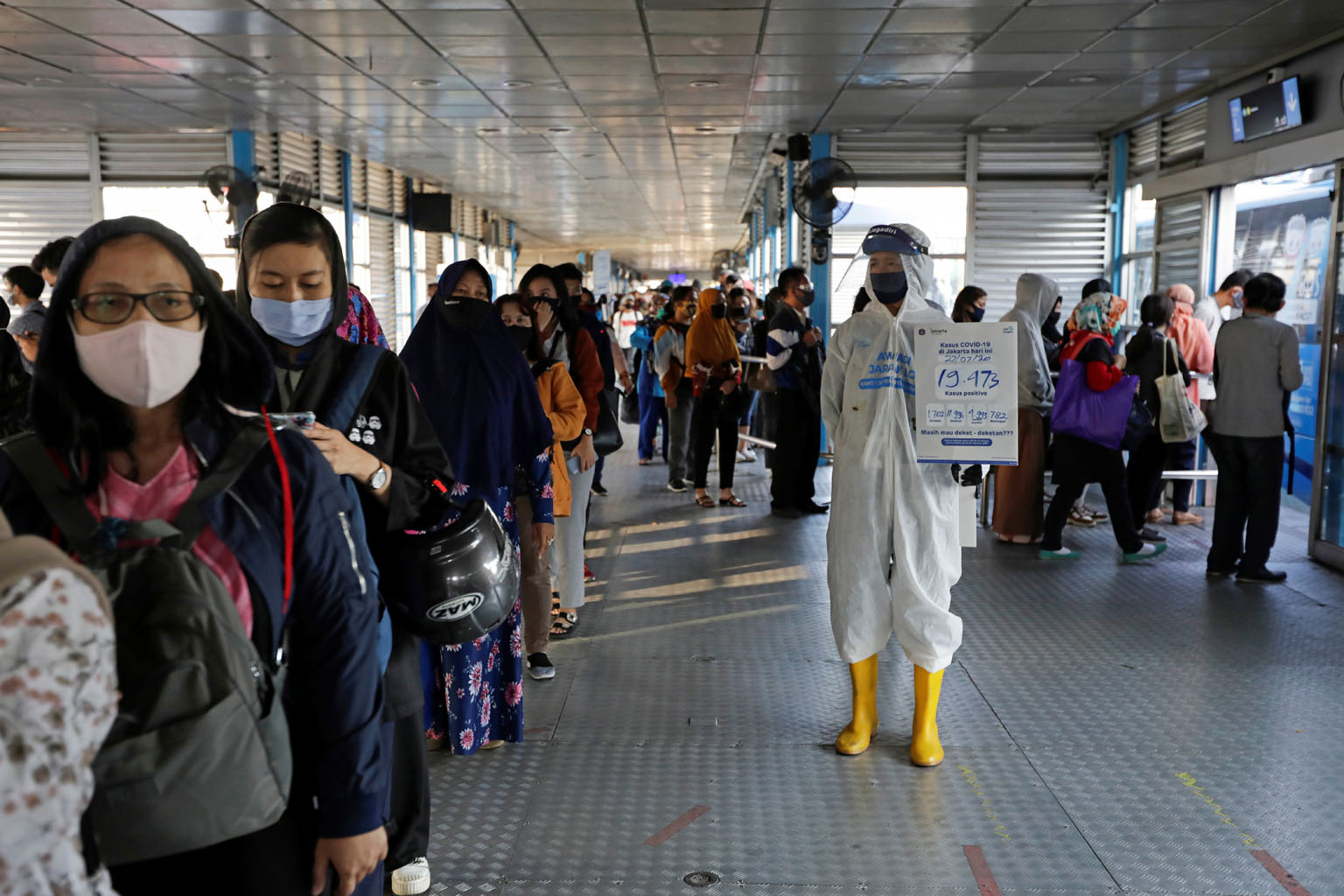COVID-19 SPECIAL
Coronavirus: Jakarta sees surge in workplace cases
Non-essential businesses have become hot spots as public fatigue sets in
Sign up now: Get ST's newsletters delivered to your inbox

A worker at a central bus hub in Jakarta holding a placard with the total number of positive Covid-19 cases on Monday written on it. Since the middle of the month, some 45 clusters - of two or more simultaneous infections - have emerged as residents take trains and buses to work and mingle with co-workers, often without using masks.
PHOTO: REUTERS
Jeffrey Hutton Regional Correspondent In Jakarta, Jeffrey Hutton
Follow topic:
Jakarta's Health Agency head Widyastuti said the Indonesian capital is in the midst of a surge of workplace infections, as officials struggle to enjoin a weary public to remain vigilant against Covid-19.
For more than a month, Jakarta, home to an estimated 10 million people, had been mostly successful in cracking down and slowing the spread of infections after it began lifting a lockdown. But non-essential businesses, including in some of the city's prestigious office towers and luxury stores, have become hot spots just as they reopened.
Since the middle of the month, some 45 clusters - of two or more simultaneous infections - have emerged as residents again take trains and buses to work and mingle with co-workers, often without using masks, Ms Widyastuti, who goes by one name, told The Straits Times last Friday.
Hospital beds, too, are filling up again as the number of patients rises. And this despite the fact that the percentage of the capital's hospital beds allocated to Covid-19 patients has doubled to 40 per cent.
The reversal of fortune in Jakarta underscores the difficulties in controlling a disease in a city that is home to millions of migrant workers, who arrive from harder-hit places elsewhere in the country.
"This is a heterogeneous city," Ms Widyastuti said.
"We're not like Yogyakarta where the Sultan can issue an order and everyone obeys," she added, referring to the central Javanese city's widely revered monarch.
Concern is clearly growing in Jakarta about rising infections.
Last Saturday, Indonesia Eximbank, the state-owned export financing agency, said it would shut its offices in the Sudirman Central Business District for two weeks.
Fashion brand Christian Dior said it had shut its boutique in the nearby Plaza Senayan shopping mall last Saturday owing to an infection among one of its employees. The shop was due to open again yesterday, according to a company statement.
Days earlier, Bank Central Asia said it had shuttered one of its business units in the 44-storey Equity Tower, just a stone's throw away.
Officials began lifting restrictions on non-essential businesses early last month as the number of active cases dropped.
On June 6, the number of people self-isolating and in intensive care totalled 4,411, official data showed.
About a month later, by July 6, that number fell to 3,835. But that tally had surged to 6,695 as of Monday.
To be sure, a second lockdown is not imminent.
Hospitals retain capacity and the percentage of positive test results is steady at 5.2 per cent - less than half the national average but well above places like South Korea, where it is less than 1 per cent. The rate of infection - or Rt - is 1.1, indicating one carrier of the virus infecting on average slightly more than one other person.
Contact tracing remains limited, at roughly five other people for every new infection. But after months of imperfect compliance of social distancing, fatigue is setting in.
"People are not using masks," said Dr Erlang Samaoedro, a pulmonary specialist at Persahabatan hospital, one of the capital's main hospitals for Covid-19.
Nearly all of its 202 beds are filled with Covid-19 patients, compared with 120 at the beginning of the month, Dr Erlang said.

